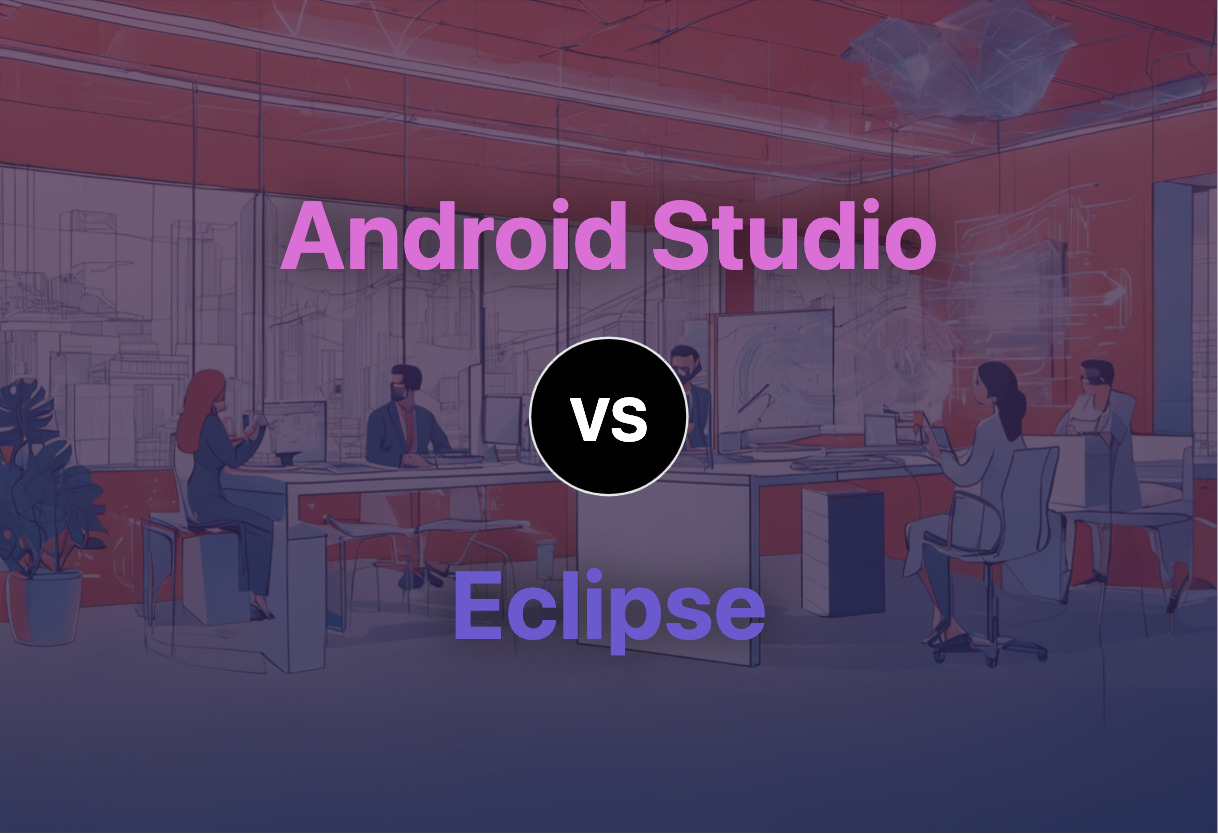
Introduction
Choosing the right IDE for Android development involves selecting a workflow that aligns with your development needs. Both Android Studio and Eclipse have been widely used in the industry, each with its own set of features and limitations. Android Studio, developed by Google, is specifically designed for Android app development and has become the go-to choice for many developers. Eclipse, on the other hand, is a versatile IDE supporting multiple programming languages and platforms.
User Interface and Usability
Android Studio
- Sleek and Modern Interface: Designed specifically for Android development.
- Drag-and-Drop Layout Editor: Simplifies designing user interfaces visually.
- Intelligent Code Editor: Provides real-time suggestions and error detection.
- Additional Features: Code completion, refactoring tools, and real-time error checking.
Eclipse
- Generic Interface: Can feel cluttered due to support for multiple programming languages.
- Highly Customizable: Tailor it to specific needs through plugins and configurations.
- Lack of Dedicated Layout Editor: Requires third-party plugins or manual coding for UI design.
Performance and Speed
Android Studio
- Resource-Intensive: Uses a lot of RAM and CPU, especially on older machines.
- Optimized for Android Development: Faster for building and deploying apps.
- Gradle Build System: Highly customizable builds that integrate well with other tools.
Eclipse
- Lighter on System Resources: Better for older or less powerful computers.
- Performance Lag: Can slow down with large projects or multiple plugins.
- Ant or Maven Build Systems: Less intuitive and require more manual configuration.
Code Editing and Debugging
Android Studio
- Intelligent Code Completion: Helps write cleaner, more efficient code.
- Robust Debugger: Features like breakpoints, watchpoints, and step-by-step execution.
- Instant Run: Quick testing of changes without a full rebuild.
Eclipse
- Strong Code Editing Capabilities: Lacks some advanced features found in Android Studio.
- Functional Debugger: May not be as intuitive or powerful, requiring more manual configuration.
Build and Deployment
Android Studio
- Gradle Build System: Highly customizable and integrates well with other tools.
- Streamlined Deployment: Easy testing on both emulators and physical devices.
- Android Emulator: Fast and feature-rich, ideal for testing apps in various environments.
- Integration with Google Services: Seamless access to Firebase and Google Cloud.
Eclipse
- Ant or Maven Build Systems: Require more manual configuration compared to Gradle.
- Cumbersome Deployment: Often requires additional steps for running apps on devices or emulators.
- Modular Design: Provides flexibility through multiple plugins but lacks streamlined build and deployment processes.
Pros and Cons of Each IDE
Android Studio
Pros:
- Built specifically for Android development.
- Fast and feature-rich emulator.
- Drag-and-drop layout editor.
- Quick testing of changes with Instant Run.
- Smart and context-aware code suggestions.
Cons:
- Requires a lot of RAM and CPU.
- Can be complex for beginners.
- Sometimes slow Gradle builds.
Alternatives:
- IntelliJ IDEA: Similar features, less resource-heavy.
- Visual Studio Code: Lightweight, with extensions for Android development.
- Xamarin: Good for cross-platform development.
Eclipse
Pros:
- Highly customizable with plugins.
- Uses fewer resources.
- Supports multiple programming languages.
Cons:
- Less frequent updates.
- Requires manual configuration.
- Not as robust for Android development.
Alternatives:
- NetBeans: Similar modularity, better support.
- Apache Cordova: Good for hybrid mobile apps.
- React Native: Excellent for cross-platform apps with JavaScript.
Choosing Between Android Studio and Eclipse
Android Studio
Offers a modern, integrated development environment with features like intelligent code editing, real-time profilers, and built-in support for Google services. Tailored specifically for Android development, making it the preferred choice for most developers today.
Eclipse
A versatile IDE supporting multiple programming languages and platforms. Highly customizable and suitable for various types of projects, not just Android apps. However, it lacks some specialized tools and ease-of-use features found in Android Studio.
Additional Considerations
Visual Studio Code
Another popular text editor that can be used for Android development through extensions. Stands out for simplicity and flexibility, making it easier for beginners to learn. However, lacks specialized tools and features that make Android Studio powerful for Android development.
Cross-Platform Development
For developers working across different platforms or languages, Visual Studio might be a better choice. Supports multiple languages and platforms, making it ideal for cross-platform development. For those focused solely on Android app development, Android Studio remains the preferred choice.
Learning Curve
Android Studio has a steeper learning curve compared to VS Code due to its complexity and specialized features. Once accustomed to its interface and tools, it offers a more streamlined development experience tailored specifically for Android apps.
Resource Requirements
Android Studio requires significant system resources, which can be a drawback for older computers. However, its performance is optimized for Android development tasks, making it faster for building and deploying apps.
Choosing between Android Studio and Eclipse depends on specific needs as a developer. If focused solely on Android app development, Android Studio is the best bet due to its tailored features, robust debugging tools, and streamlined build and deployment process. For those needing to work on multiple projects or languages, Eclipse might be more suitable due to its versatility and customization options. Ultimately, the choice between these two IDEs should be based on project requirements, team expertise, and target platforms. Both tools are powerful, but the right one will make the development process smoother and more efficient.
